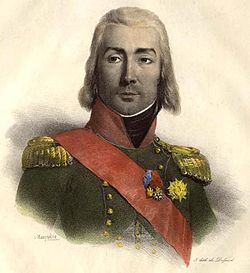- Jean-Baptiste Bessières
-
Jean-Baptiste Bessières Born 6 August 1768
Prayssac, FranceDied 1 May 1813 (aged 44)
Weißenfels, Saxony-AnhaltAllegiance Kingdom of France (1791-1792),
 French First Republic,
French First Republic,
 First French Empire
First French EmpireService/branch Cavalry Years of service 1791-1813 Rank General of Division Battles/wars French Revolutionary Wars,
Napoleonic WarsAwards Marshal of France,
Légion d'honneur (Grand Eagle),
Order of the Iron Crown (Commander),
Name inscribed under the Arc de Triomphe,
Order of the Crown (Württemberg) (Knight),
Duke of Istria,
Military Order of St. Henry (Grand Cross),
Order of Christ (Portugal) (Knight)Relations Bertrand Bessières (brother),
Julien Bessières (cousin)Jean-Baptiste Bessières, 1st Duc d' Istria (6 August 1768 – 1 May 1813) was a Marshal of France of the Napoleonic Era. His younger brother, Bertrand, followed in his footsteps and eventually became a Divisional General. Their cousin, Géraud-Pierre-Henri-Julien also served Napoleon I as a diplomat and Imperial official.
Biography
Bessières was born in Prayssac near Cahors in southern France. He served for a short time in the "Constitutional Guard" of Louis XVI and as a non-commissioned officer took part in the war against Spain.
In the Army of the Eastern Pyrenees and in the Army of the Moselle he repeatedly distinguished himself for valour, and in 1796, as captain, he served in Napoleon Bonaparte's Italian campaign. At Rovereto his conduct brought him to his chief's notice, and after the Battle of Rivoli he was sent to France to deliver the captured colours to the Directory. Hastening back to the front, he accompanied Napoleon in the invasion of Styria in command of the "Guides," who formed the nucleus of the later Consular and Imperial Guards.
As a chef de brigade he next served in the Egyptian expedition, and won further distinction at Acre and Aboukir.
Returning to Europe with Napoleon, he was present at Marengo (1800) as second-in-command of the Consular Guard, and led a brilliant and successful cavalry charge at the close of the day, though its effect on the battle was not as decisive as Napoleon pretended.
Promoted to general of division in 1802 and marshal of France in 1804, he made the most famous campaigns of the Grande Armée as colonel-general of the Guard Cavalry (1805, 1806 and 1807).
In 1805 he received the Grand Eagle of the Legion of Honour, and in 1809 was entitled Duke of Istria, or duc d'Istrie. It was a duché grand-fief, a rare, nominal, but hereditary honor (extinguished in 1856) in Napoleon's own Kingdom of Italy.
With the outbreak of the Peninsular War, Marshal Bessières had his first opportunity of an independent command, and his crushing victory over the Spaniards in the Battle of Medina del Rio Seco (1808) justified Napoleon's choice. When disaster in other parts of the theatre of war called Napoleon himself to the Peninsula, Bessiêres continued to give the Emperor the very greatest assistance in his campaign.
In 1809 he was again with the Grande Armée in the Danube valley. At Essling his repeated and desperate charges checked the Austrians in the full tide of their success. At the Battle of Wagram he had a horse killed under him. Replacing Jean-Baptiste Bernadotte in the command of the Army of the North, a little later in the same year, the newly-created Duke of Istria successfully opposed the British Walcheren expedition, and in 1811 he was back again, in a still more important command, in Spain. As André Masséna's second-in-command he was present at the battle of Fuentes d'Onoro, but Napoleon never detached him for very long. In 1812 he commanded the Guard Cavalry at the Battle of Borodino and in the retreat from Moscow. Wherever engaged he won further distinction, and at the beginning of the 1813 campaign he was appointed to the command of the whole of Napoleon's cavalry.
Three days after the opening of the campaign, while reconnoitering the defile of Poserna-Rippach, Bessières was killed by a cannon ball which ricocheted off a wall and hit him in the chest. He died instantly. Napoleon, who deeply felt the loss of one of his truest friends and ablest commanders, protected his children, and his eldest son was made a member of the Chamber of Peers by Louis XVIII.
As a commander, especially of cavalry, Bessières left a reputation excelled by very few of Napoleon's marshals, and his dauntless courage and cool judgement made him a safe leader in independent command. He was personally beloved to an extraordinary extent amongst his soldiers, and respected amongst his opponents. It is said that masses were performed for his soul by the priests of insurgent Spain, and the king of Saxony raised a monument to his memory. Napoleon once said that he could have won at Waterloo if Bessières had been there.
Sources and references
 This article incorporates text from a publication now in the public domain: Chisholm, Hugh, ed (1911). Encyclopædia Britannica (11th ed.). Cambridge University Press. [1]
This article incorporates text from a publication now in the public domain: Chisholm, Hugh, ed (1911). Encyclopædia Britannica (11th ed.). Cambridge University Press. [1]- Heraldica.org - Napoleonic heraldry
Marshals of the First French Empire  Categories:
Categories:- 1768 births
- 1813 deaths
- People from Lot
- Dukes of the First French Empire
- French military personnel of the French Revolutionary Wars
- French military personnel killed in the Napoleonic Wars
- French commanders of the Napoleonic Wars
- Commanders in the French Imperial Guard
- Marshals of France
- Grand Croix of the Légion d'honneur
Wikimedia Foundation. 2010.



